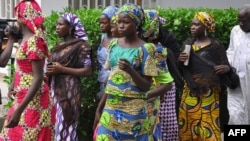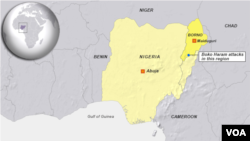ABUJA, NIGERIA —
Witnesses in Nigeria say that suspected Boko Haram militants have kidnapped 20 women near the town where the group abducted more than 200 schoolgirls in April, but police are denying the report.
The witnesses said Monday that gunmen drove into the northeastern Garkin Fulani settlement and forced the women into their vehicles. They say the abductions took place on Thursday.
The settlement is near Chibok, the town where the April abductions occurred.
More than a month ago, Nigerian activists captured international attention as they took to the streets, demanding the rescue of schoolgirls kidnapped by Boko Haram.
The Nigerian government and governments around the world pledged to find the girls. They have now been missing for almost two months, and more women and girls have been kidnapped.
Andrew Stroehlein, the European media director for Human Rights Watch, said Boko Haram’s now five-year-old insurgency has resulted in "crimes against humanity."
“Kidnappings have gone on before. Kidnappings of girls in schools has gone on before," said Stroehlein. "These kinds of abuses - entire villages eradicated - there’s a humanitarian crisis. There is a whole wave of murder and mayhem by Boko Haram that is essentially crimes against humanity.”
Gunpoint abductions
The women were kidnapped at gunpoint last week from an area called Garkin Fulani, a nomadic cow herding settlement. Locals said three young men tried to stop gunmen from forcing the women into a truck, and they, too, were captured.
This comes as violence again appears to be on the rise in northeastern Nigeria, where three states have been under emergency rule for more than a year.
E.J. Hogendoorn, the deputy director for Africa at the International Crisis Group in Washington, D.C., said that as the Boko Haram insurgency continues to grow more deadly, some of the core problems that allowed the group to emerge in the first place - like extreme poverty, lack of development and widespread corruption - have not been addressed.
He said while the group is recognized as an international terrorist group by several countries, including the United States, it is essentially a Nigerian problem.
“This is not some kind of international terrorist group necessarily, but this is a home-grown problem that has been allowed to fester until it has become this monster that they can no longer control,” said Hogendoorn.
Boko Haram has killed thousands of people, including hundreds of school children, and the United Nations estimates half a million people have fled their homes because of the insurgency.
In a video released last month, Abubakar Shekau, who claims to lead Boko Haram, showed footage of about 100 girls, many who were later identified as the kidnapped schoolgirls. Shekau, not seen with the girls in the video, then threatened to kidnap more women and girls to be held as slaves, sold into marriage or held as vengeance for the wives and children of Boko Haram members held in Nigerian prisons.
The witnesses said Monday that gunmen drove into the northeastern Garkin Fulani settlement and forced the women into their vehicles. They say the abductions took place on Thursday.
The settlement is near Chibok, the town where the April abductions occurred.
More than a month ago, Nigerian activists captured international attention as they took to the streets, demanding the rescue of schoolgirls kidnapped by Boko Haram.
The Nigerian government and governments around the world pledged to find the girls. They have now been missing for almost two months, and more women and girls have been kidnapped.
Andrew Stroehlein, the European media director for Human Rights Watch, said Boko Haram’s now five-year-old insurgency has resulted in "crimes against humanity."
“Kidnappings have gone on before. Kidnappings of girls in schools has gone on before," said Stroehlein. "These kinds of abuses - entire villages eradicated - there’s a humanitarian crisis. There is a whole wave of murder and mayhem by Boko Haram that is essentially crimes against humanity.”
Gunpoint abductions
The women were kidnapped at gunpoint last week from an area called Garkin Fulani, a nomadic cow herding settlement. Locals said three young men tried to stop gunmen from forcing the women into a truck, and they, too, were captured.
This comes as violence again appears to be on the rise in northeastern Nigeria, where three states have been under emergency rule for more than a year.
E.J. Hogendoorn, the deputy director for Africa at the International Crisis Group in Washington, D.C., said that as the Boko Haram insurgency continues to grow more deadly, some of the core problems that allowed the group to emerge in the first place - like extreme poverty, lack of development and widespread corruption - have not been addressed.
He said while the group is recognized as an international terrorist group by several countries, including the United States, it is essentially a Nigerian problem.
“This is not some kind of international terrorist group necessarily, but this is a home-grown problem that has been allowed to fester until it has become this monster that they can no longer control,” said Hogendoorn.
Boko Haram has killed thousands of people, including hundreds of school children, and the United Nations estimates half a million people have fled their homes because of the insurgency.
In a video released last month, Abubakar Shekau, who claims to lead Boko Haram, showed footage of about 100 girls, many who were later identified as the kidnapped schoolgirls. Shekau, not seen with the girls in the video, then threatened to kidnap more women and girls to be held as slaves, sold into marriage or held as vengeance for the wives and children of Boko Haram members held in Nigerian prisons.






